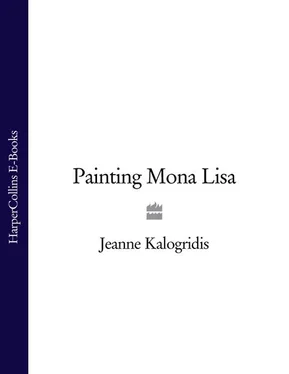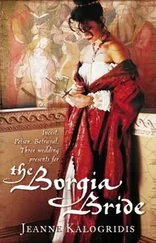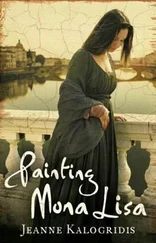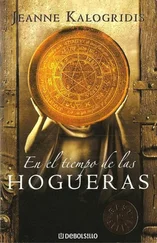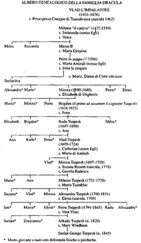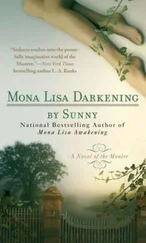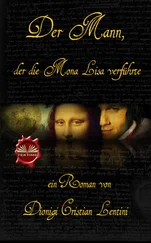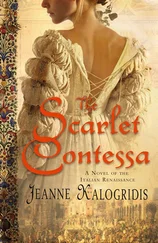‘He was. It is quite accurate. And quite rare.’
I tucked it at once into my belt. My mother and I both shared a love of such trinkets, and of art, though my father disapproved of my having anything so impractical. As a merchant, he had worked hard for his wealth, and hated to see it squandered on anything useless. But I was thrilled; I hungered for such things.
‘Zalumma,’ my mother called. ‘I am ready to leave.’
Zalumma came to fetch us at once, and took hold of my mother’s arm again. But when my mother began to turn away from the altar – she paused, and wrinkled her nose. ‘The candles …’ she murmured. ‘Have the altar vestments caught fire? Something is burning …’
Zalumma’s expression went slack with panic, but she recovered herself immediately and said calmly, as if it were the most normal thing in the world: ‘Lie down, Madonna. Here, on the floor. All will be well.’
‘It all repeats,’ my mother said, with the odd catch in her voice I had come to dread.
‘Lie down!’ Zalumma ordered, as sternly as she would a child. My mother seemed not to hear her, and when Zalumma pressed on her limbs, trying to force her to the ground, she resisted.
‘It all repeats,’ my mother said swiftly, frantically. ‘Don’t you see it happening again? Here, in this sacred place.’
I lent my weight to Zalumma’s; together we fought to bring my mother down, but it was like trying to bring down an immovable mountain – one that trembled.
My mother’s arms moved involuntarily from her sides and shot straight out, rigid. Her legs locked beneath her. ‘There is murder here, and thoughts of murder!’ she shrieked. ‘Plots within plots once more!’
Her cries grew unintelligible as she went down.
Zalumma and I clung to her so that she did not land too harshly.
My mother writhed on the cold floor of the cathedral, her blue cloak gaping open, her silver skirts pooling around her. Zalumma lay across her body; I put my kerchief between her upper teeth and tongue, then held onto her head.
I was barely in time. My mother’s dark eyes rolled back until only the veined whites were visible – then the rigors began. Head, torso, limbs – all began to jerk arrhythmically, rapidly.
Somehow Zalumma held on, rising and falling with the waves, whispering hoarsely in her barbarous tongue, strange words coming so fast and so practised I knew they were part of a prayer. I, too, began to pray without thinking in a language equally old: ‘Ave Maria, Mater Dei, ora pro nobis pecatoribus, nunc et in hora mortis nostrae …’
I focused on the linen kerchief in my mother’s mouth – on her champing teeth, and the small specks of blood there – and on her jerking head, which I now held fast in my lap, so I was startled into fright when a stranger beside us began praying loudly, also in Latin.
I glanced up to see the black-frocked priest who had been tending the altar. He alternated between sprinkling my mother with liquid from a small vial and making the sign of the cross over her while he prayed.
At last the time came when my mother gave her final wrenching groan, then fell limp; her eyelids fluttered shut.
Beside me, the priest – a young red-haired man with florid, pock-marked skin – rose. ‘She is like the woman from whom Jesus cast out nine devils,’ he said with authority. ‘She is possessed.’
Sore and halting from the struggle, Zalumma nonetheless rose to her full height – a hand’s breadth taller than the priest – and glared at him. ‘It is a sickness,’ she said, ‘of which you know nothing.’
The young priest shrank, his tone now only faintly insistent. ‘It is the Devil.’
I glanced from the priest’s face to Zalumma’s stern expression. I was mature for my age and knew responsibility: my mother’s delicate health had forced me to act as mistress of the household many times, playing hostess to guests, accompanying my father in her place on social occasions, and for the last three years I had gone with Zalumma to the market in my mother’s place. But I was young in terms of my knowledge of the world, and of God. I was still undecided as to whether God was punishing her for some early sin, and whether her fits were indeed of sinister origin. But I knew only that I loved her, pitied her, and disliked the priest’s condescension.
Zalumma’s white cheeks turned shell pink. I knew her well: a scathing reply had formed in her mind, and teetered upon her rouged lips, but she checked it. She had need of the priest.
Her manner turned abruptly unctuous. ‘I am a poor slave, with no right to contradict a learned man, Father. Here, we must get my mistress to the carriage. Will you help us?’
The priest looked on her with justifiable suspicion, but he could not refuse. And so I ran to find our driver; when he had brought the carriage round to the front of the cathedral, he and the priest carried my mother to it.
Exhausted, she slept with her head cradled in Zalumma’s lap; I held her legs. We rode home directly back over the Ponte Santa Trinita, a homely stone bridge which housed no shops.
Our palazzo on the Via Maggio was neither large nor ostentatious, though my father could have afforded to adorn the house more. It had been built a century before by his great-great-grandfather from plain pietra serena, an expensive, but subtle grey stone. My father had made no additions, added no statuary, nor replaced the plain, worn floors or the scarred doors; he eschewed unnecessary adornment. We rode inside the gate, then Zalumma and the driver lifted my mother from the carriage.
To our horror, my father Antonio stood watching in the loggia.
XII XII XIII XIV XV XVI XVII XVIII XIX XX XXI XXII XXIII XXIV XXV XXVI XXVII XXVIII XXIX XXX XXXI XXXII XXXIII XXXIV XXXV XXXVI XXXVII XXXVIII XXXIX XL XLI XLII XLIII XLIV XLV XLVI XLVII XLVIII XLIX L LI LII LIII LIV LV LVI LVII LVIII LIX LX LXI LXII LXIII LXIV LXV LXVI LXVII LXVIII LXIX LXX Epilogue: Lisa July 1498 LXXI Acknowledgements By the same author Copyright About the Publisher
My father had returned early. Dressed in his usual dark farsetto, a crimson mantle and black leggings, he stood with his arms crossed at the entry to the loggia so that he would not miss us. He was a sharp-featured man, with golden brown hair that grew in darker at the crown, a narrow hooked nose, and thunderous eyebrows above pale amber eyes. His disregard for fashion showed in his face; he wore a full beard and moustache at a time when it was common for men to be clean-shaven or wear a neat goatee.
Yet, ironically, no one knew more about Florence’s current styles and cravings. My father owned a bottega in the Santa Croce district, near the ancient Wool Guild, the Arte de Lana. He specialized in supplying the very finest wools to the city’s wealthiest families. He often went to the Medici palazzo on the Via Larga, his carriage heavy with plush fabrics coloured with chermisi, the most expensive of dyes made from the dried carcasses of lice, which produced the most exquisite crimson, and alessandrino, a costly and beautiful deep blue.
Sometimes I rode with my father and waited in the carriage while he met with his most important clients at their palazzi. I enjoyed the rides, and he seemed to enjoy sharing the details of his business, speaking to me as if I were his equal; at times, I felt guilty because I was not a son who could take over the family trade. I was his sole heir, and a girl. God had frowned upon my parents, and it was taken for granted that my mother and her fits were to blame.
And now there was no hiding the fact that our secret escapade had just caused her to suffer another one.
My father was, for the most part, a self-possessed man. But certain things goaded him – my mother’s condition was one of them – and it could induce an uncontrollable rage. As I crawled from the carriage to walk behind Zalumma and the others, I saw the danger in his eye and looked guiltily away.
Читать дальше
